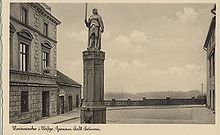Hermann von Balk
Hermann von Balk († March 5, 1239 in Würzburg ; also Hermann Balko, Hermann Balco, Hermann Balk) was a knight and first landmaster of the Teutonic Order in Prussia. From 1219 to 1230 he was German master of the order and from 1230 to his death in 1239 Landmeister of Prussia . These practiced Balk in the years 1237-1238 the post of Country Master in Livonia from.
biography
In 1226 Emperor Friedrich II entrusted the Teutonic Order with the Golden Bull of Rimini with areas north of the Vistula to be acquired as imperial fiefs . In his capacity as landmaster, Balk conquered Pomesania and northern Warmia in ten years of battles against the Prussians from 1230 onwards . The basic agreement of the Teutonic Order with Duke Konrad of Mazovia, who represents his own interests in the Kulmer Land, in the Treaty of Kruschwitz in 1230 is also very likely due to an initiative by Balk.
After the devastating defeat of the Livonian Brotherhood of the Sword against the Lithuanians in the Battle of Schaulen (1236) and the incorporation of the Brotherhood of Swords into the Teutonic Order as the Livonian Order, Hermann von Balk also took over the administration of the newly acquired areas of Livonia and Courland . Hermann von Balk always proved to be a capable executor of the far-reaching plans of his Grand Master Hermann von Salza , who met the legal requirements for the unification of the Teutonic Order with the Brothers of the Sword on the basis of the Viterber Union with Pope Gregory IX. negotiated in Viterbo, Italy .
Services
Balk founded the castles Marienwerder , Kulm , Elbing and Thorn , from which the cities of the same name soon emerged. This can be explained by the onset of the influx of German settlers. Balk promoted the settlement, for example, through the proclamation of the Kulm Law , a legal form based on Magdeburg's city law. The Kulmische Handfest of December 28, 1233, designed by Hermann von Balk together with Grand Master Hermann von Salza, became the basis for the legal formation of almost all Prussian cities. The two towns of Kulm and Thorn were initially provided with this legal basis.
The far-sighted policy of the first Landmeister played an outstanding role in the Christianization of Prussia. Balk proceeded according to plan, whereby he attached great importance to winning over the leading class of the Prussians for the order. On the other hand, any resistance was fought ruthlessly. The expansion of the Teutonic Order took place along the main traffic routes of the 13th century; accordingly, the crusaders proceeded north on the navigable rivers. Settlement followed after conquest. The oldest surviving mortgage deed of a Mr. Dietrich von Depenau in Tiefenau in the Marienwerder area dates from 1236 .
Serious differences, etc. a. with Denmark , which continued to make territorial claims, particularly in Estonia, and the Bishop of Riga regarding the unclear legal situation regarding the exercise of sovereignty and the resistance of the sword brothers caused Balk "to drive out of the country". Later sources also say that he was seriously ill. He died on March 5, 1239 in Würzburg.
Aftermath
The memory of Hermann von Balks crucial role in the conquest of the Kulmerland and as the actual founder of the religious state was very much alive in West Prussia until the annexation of this area to Poland in 1919. This is evidenced by numerous monuments and, in particular, artfully designed fountains in West Prussian cities, which preferred to bear the name of this first Landmeister.
literature
- Karl Lohmeyer : Balko, Herrmann . In: Allgemeine Deutsche Biographie (ADB). Volume 2, Duncker & Humblot, Leipzig 1875, p. 20 f.
- Hans Prutz : The orders of knights . Bechtermünz Verlag, Berlin 1908
- Walther Hubatsch : Balk (e), Hermann. In: New German Biography (NDB). Volume 1, Duncker & Humblot, Berlin 1953, ISBN 3-428-00182-6 , p. 559 ( digitized version ).
- Wolfgang Sonthofen: The German Order . Weltbild Verlag, Augsburg 1995
- Dieter Zimmerling: The German order of knights . ECON Verlag, Munich 1998
- Horst FE Dequin: Origin and career of Hermann Balk, the first Landmeister of the Teutonic Order in Prussia - a genealogical-personal-historical investigation. Self-published, Westerhorn 1996
- Horst FE Dequin: Hermann Balk, the first Prussian. Self-published, Westerhorn 1995
Web links
- Literature by and about Hermann von Balk in the catalog of the German National Library
- u. a. Images of the Hermann Balk Fountain in Elbing
| predecessor | Office | successor |
|---|---|---|
| - |
German Master of the Teutonic Order 1219–1230 |
Lockpick ? |
| - |
Landmaster of Prussia of the Teutonic Order 1229–1239 |
Heinrich von Weida |
| Volkwin von Naumburg to Winterstätten |
Landmaster in Livonia of the Teutonic Order 1237–1238 |
Dietrich von Grüningen |
| personal data | |
|---|---|
| SURNAME | Balk, Hermann von |
| ALTERNATIVE NAMES | Balko, Hermann; Balco, Hermann; Balk, Hermann |
| BRIEF DESCRIPTION | Knight of the Teutonic Order, German Master, Land Master of Prussia and Livonia |
| DATE OF BIRTH | 12th century or 13th century |
| DATE OF DEATH | March 5, 1239 |
| Place of death | Wurzburg |

